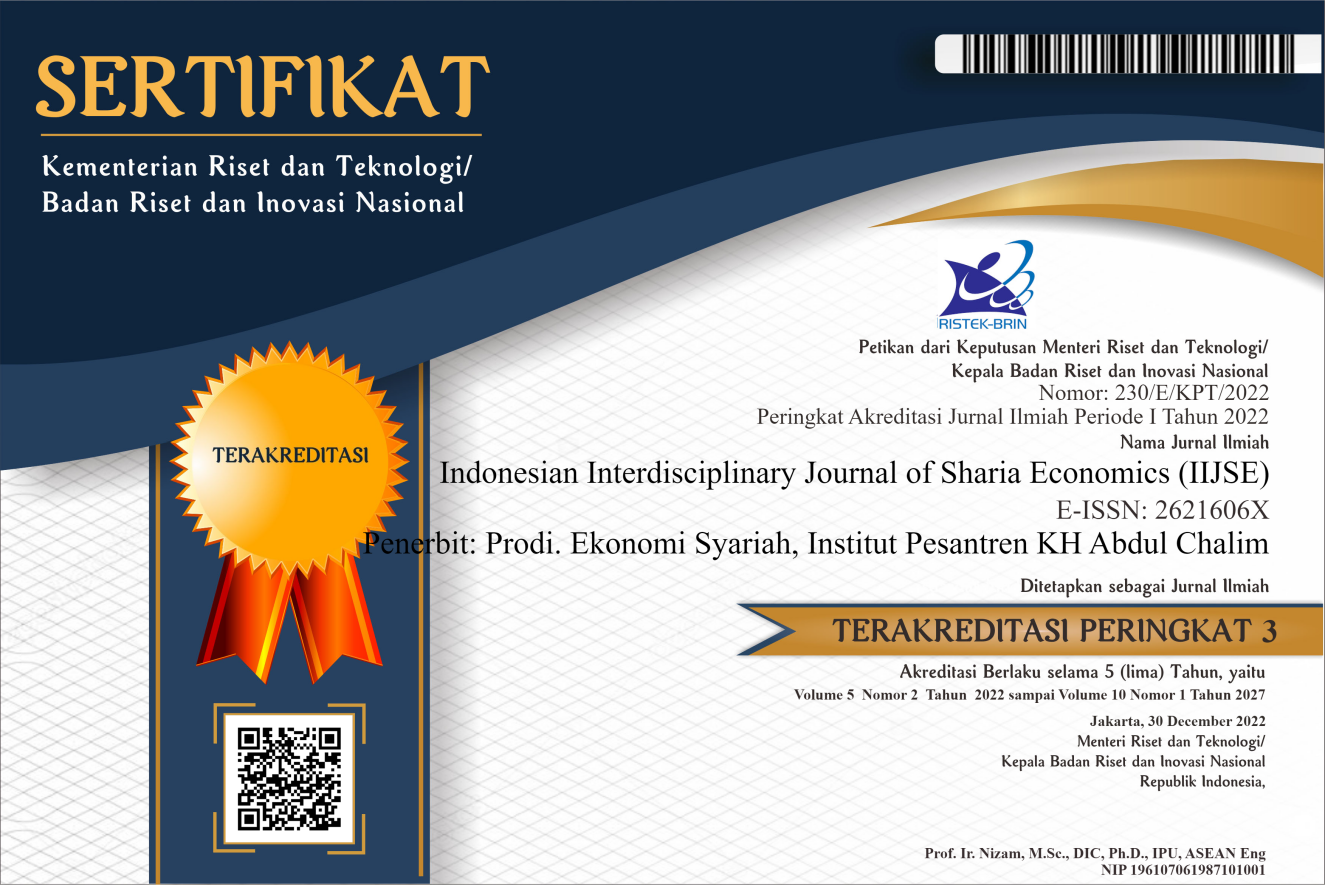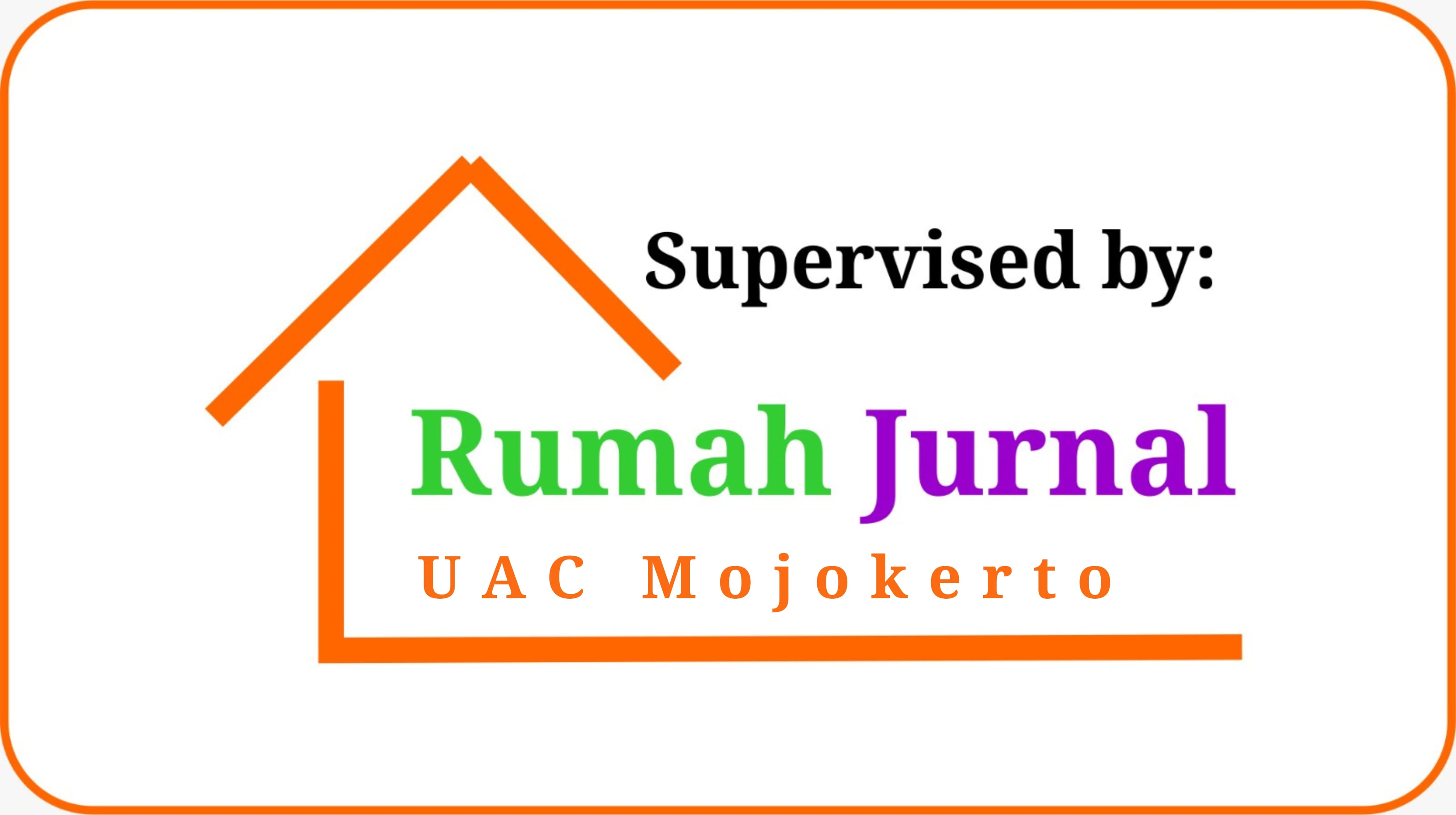Integrating Sustainable Supply Chain Practices and Risk Management: Strategies to Enhance MSMEs Performance in Indonesia
Abstract
This study aims to investigate the implementation of Sustainable Supply Chain Management Practices (SSCMP) in Micro, Small, and Medium Enterprises (MSMEs), which are important contributors to economic development but are still limited in their implementation. Through exploring the role of Supply Chain Risk Management (SCRM) as a mediating and moderating variable in improving MSME Sustainable Performance (SP). This study aims to provide a comprehensive understanding of how effective SCRM implementation can significantly affect MSME performance and sustainability. This study adopts a quantitative approach, building on previous studies to formulate hypotheses and conceptual frameworks, and adding a new variable, SCRM. Exploratory Factor Analysis was conducted to align the indicators with the specific conditions of MSMEs in Indonesia. Data were collected from 152 MSMEs in various sectors and processed using SEM-PLS to evaluate the proposed model and test the hypotheses. The findings reveal that SSCMP has a significant positive impact on SP and SCRM. SCRM was found to have a significant positive influence on SP, as well as a significant mediating role in the relationship between SSCMP and SP, thus enhancing the positive impact of SSCMP on performance. Other findings indicate that SCRM does not act as a moderating variable in the relationship between SSCMP and SP, indicating that its influence is more mediating than interactive. This study contributes theoretically by showing that SSCMP positively influences SP and SCRM, with SCRM acting as a significant mediator, but fails to support its role as a moderator in the relationship.
Downloads
References
Abbasi, B., Farsijani, H., & Raad, A. (2016). Investigating the Effect of Supply Chain Management on Sustainable Performance Focusing on Environmental Collaboration. Modern Applied Science, 10(12), 115. https://doi.org/10.5539/mas.v10n12p115
Almohtaseb, A., Aldehayyat, J., Al Khattab, A., & Alabaddi, Z. (2024). The role of supply chain management in improving performance of Jordanian small and medium enterprises. Problems and Perspectives in Management, 22(1), 218–230. https://doi.org/10.21511/ppm.22(1).2024.19
Ari Sulistiogo. (2019). Pengaruh Kualitas SDM Dan Akses Informasi Terhadap Akses Permodalan Dan Dampaknya Terhadap Kinerja UMKM Mitra LPDB-KUMKM. JURNAL DINAMIKA MANAJEMEN DAN BISNIS, 2(1), 65–76. https://doi.org/10.21009/JDMB.02.1.5
Arora, A., Arora, A. S., Sivakumar, K., & Burke, G. (2020). Strategic sustainable purchasing, environmental collaboration, and organizational sustainability performance: the moderating role of supply base size. Supply Chain Management: An International Journal, 25(6), 709–728. https://doi.org/https://doi.org/10.1108/scm-07-2019-0284
Arora, A., Arora, A. S., Sivakumar, K., & Burke, G. (2020). Strategic sustainable purchasing, environmental collaboration, and organizational sustainability performance: the moderating role of supply base size. Supply Chain Management, 25(6), 709–728. https://doi.org/10.1108/SCM-07-2019-0284
Aylak, B. L. (2022). Impacts of Sustainability on Supply Chain Management Sürdürülebilirliğin Tedarik Zinciri Yönetimi Üzerine Etkileri. 34, 105–109. https://doi.org/10.31590/ejosat.1075779
Can Saglam, Y., Yildiz Çankaya, S. and Sezen, B. (2021). Proactive risk mitigation strategies and supply chain risk management performance: an empirical analysis for manufacturing firms in Turkey. Journal of Manufacturing Technology Management, 32(6), 1224–1244. https://doi.org/https://doi.org/10.1108/JMTM-08-2019-0299
El Baz, J., & Ruel, S. (2021). Can supply chain risk management practices mitigate the disruption impacts on supply chains’ resilience and robustness? Evidence from an empirical survey in a COVID-19 outbreak era. International Journal of Production Economics, 233(June 2020). https://doi.org/10.1016/j.ijpe.2020.107972
Fitriasari, F. (2020). How do Small and Medium Enterprise (SME) survive the COVID-19 outbreak? Jurnal Inovasi Ekonomi, 5(02). https://doi.org/10.22219/jiko.v5i3.11838
Hair J, R, A., Babin B, & Black W. (2014). Multivariate Data Analysis.pdf. In Australia : Cengage: Vol. 7 edition (p. 758).
Hanumsari, F., Liestyana, Y., & Utami, Y. (2021). The effect of green supply chain management practices on sustainability performance. Jurnal Riset Ekonomi Manajemen, 5(1), 1–16. https://doi.org/10.31002/rn.v5i1.2789
Hisjam, M. (2019). Perkembangan Riset Bidang Manajemen Rantai Pasok Berkelanjutan. PERFORMA Media Ilmiah Teknik Industri, 17(2), 103–110. https://doi.org/10.20961/performa.17.2.20390
Hossan Chowdhury, M. M., & Quaddus, M. A. (2021). Supply chain sustainability practices and governance for mitigating sustainability risk and improving market performance: A dynamic capability perspective. Journal of Cleaner Production, 278, 123521. https://doi.org/10.1016/j.jclepro.2020.123521
Ikhwana, A., & Maulana, D. A. (2023). Strategi Perbaikan Kinerja UMKM Melalui Pendekatan Supply Chain Management. Jurnal Kalibrasi, 21(1), 29–39. https://doi.org/10.33364/kalibrasi/v.21-1.1170
Israr, A. and Siddiqui, D. A. (2020). How stakeholder pressure influence corporate sustainability, and financial performance in manufacturing industries of pakistan: the mediatory role of sustainable supply chain management. Business and Management Horizons, 8(2). https://doi.org/https://doi.org/10.5296/bmh.v8i2.18110
Katsaliaki, K., Galetsi, P., & Kumar, S. (2022). Supply chain disruptions and resilience: a major review and future research agenda. Annals of Operations Research, 319(1), 965–1002. https://doi.org/10.1007/s10479-020-03912-1
Kot, S. (2018). Sustainable Supply Chain Management in Small and Medium Enterprises. Sustainability, 10(4), 1143. https://doi.org/10.3390/su10041143
Liu, X., Zhou, Y., & Gao, S. (2022). Intellectual Structure in Supply Chain Risk Management from 2000 to 2022: A Review Based on Text Mining Approach. Sustainability, 14(23), 16245. https://doi.org/10.3390/su142316245
Maya Novitasari, D. A. (2021). Green supply chain management and firm performance: The mediating effect of green innovation. Journal of Industrial Engineering and Management, 14(2), 391. https://doi.org/https://doi.org/10.3926/jiem.3384
Nations, U. (n.d.). The 17 Goals. https://sdgs.un.org/goals
Nel, J. D., & Simon, H. (2020). Introducing a process for radical supply chain risk management. International Journal of Business Performance Management, 21. https://doi.org/https://doi.org/10.1504/ijbpm.2020.106120
Nsikan, J., Affiah, E. A., Briggs, I., & Koko, N. (2022). Sustainable supplier selection factors and supply chain performance in the Nigerian healthcare industry. Journal of Transport and Supply Chain Management, 16. https://doi.org/10.4102/jtscm.v16i0.633
Owuor, S. J. O. (2019). The effect of supply chain risk management practices on the supply chain performance of public universities in kenya. The Strategic Journal of Business & Change Management, 6(2).
Paul, S., Ali, S. M., Hasan, M. A., Paul, S. K., & Kabir, G. (2022). Critical Success Factors for Supply Chain Sustainability in the Wood Industry: An Integrated PCA-ISM Model. Sustainability, 14(3), 1863. https://doi.org/10.3390/su14031863
Purwandaru, F. Z., Santosa, W., & SD, T. (2023). Analysis of the Influence of Strategic and Operational Factors on Company Competitiveness. Global Research Review in Business and Economics, 09(05), 8–18. https://doi.org/https://doi.org/10.56805/grrbe
Purwoko, P., Judijanto, L., Abidin, Z., & Antesty, S. (2023). Sustainability Practices in MSMEs: A Quantitative Analysis of the Impact of Green Supply Chain Management, Consumer Awareness, and Regulatory Compliance on Market Performance. West Science Interdisciplinary Studies, 1(10), 1039–1048. https://doi.org/10.58812/wsis.v1i10.298
Reklitis, P., Sakas, D. P., Trivellas, P., & Tsoulfas, G. T. (2021). Performance Implications of Aligning Supply Chain Practices with Competitive Advantage: Empirical Evidence from the Agri-Food Sector. Sustainability, 13(16), 8734. https://doi.org/10.3390/su13168734
Safiye Turgay, A. A. (2023). Risk Mitigation for SMEs: A Step-by-Step Guide to Implementing an Effective Framework. Financial Engineering and Risk Management, 6(8). https://doi.org/10.23977/ferm.2023.060808
Sari, D. K., Koestiono, D., & Shinta, A. (2021). Analysis Influence Relationship Of Internal And External On Strategy And Ssustainable Supply Chains Management On Operational Performance Of Food And Beverages Agro-Industries. Agricultural Social Economic Journal, 21(3), 241–250. https://doi.org/10.21776/ub.agrise.2021.021.3.9
Schaltegger, S., Lüdeke-Freund, F., & Hansen, E. G. (2016). Business Models for Sustainability. Organization & Environment, 29(3), 264–289. https://doi.org/10.1177/1086026616633272
Setyadi, A. (2019). Does green supply chain integration contribute towards sustainable performance? Uncertain Supply Chain Management, 121–132. https://doi.org/10.5267/j.uscm.2018.10.012
Sun, J., Sarfraz, M., Khawaja, K. F., & Abdullah, M. I. (2022). Sustainable Supply Chain Strategy and Sustainable Competitive Advantage: A Mediated and Moderated Model. Frontiers in Public Health, 10. https://doi.org/10.3389/fpubh.2022.895482
Sutrisno, A., & Kumar, V. (2022). Supply chain sustainability risk decision support model using integrated Preference Selection Index (PSI) method and prospect theory. Journal of Advances in Management Research, 19(2), 316–346. https://doi.org/10.1108/JAMR-06-2021-0193
Tanaka, I., & Fitriani, K. (2024). The Analysis of Supply Chain Management Implementation for the Creative Industry in Bandung (pp. 373–381). https://doi.org/10.2991/978-94-6463-234-7_37
Um, J. and Han, N. (2020). Understanding the relationships between global supply chain risk and supply chain resilience: the role of mitigating strategies. Supply Chain Management an International Journal, 26(2), 240–255. https://doi.org/https://doi.org/10.1108/SCM-06-2020-0248
Vafaei, S., Bazrkar, A., & Hajimohammadi, M. (2019). The investigation of the relationship between sustainable supply chain management and sustainable competitive advantage according to the mediating role of innovation and sustainable process management. Brazilian Journal of Operations &Amp; Production Management, 16(4), 572–580. https://doi.org/https://doi.org/10.14488/BJOPM.2019.v16.n4.a3
Valinejad, F., Safaie, N., Rahmani, D., & Saadatmand, M. R. (2022). A Hybrid Model for Supply Chain Risk Management Based on Five-dimensional Sustainability Approach in Telecommunication Industry. International Journal of Engineering, 35(6), 1096–1110.
Wibowo, N. M., Widiastuti, Y., K., & Pancawati, I. (2024). The Role of Sustainability Orientation and Sustainable Environmental Performance in Improving Sustainable Economic Performance of the Batik Industry. KnE Social Sciences. https://doi.org/10.18502/kss.v9i10.15722
Xing, C. (2023). Critical Success Factors for a Sustainable Supply Chain : The. 0, 11–16. https://doi.org/10.54254/2754-1169/39/20231923
Yang, X., & Wang, J. (2023). The relationship between sustainable supply chain management and enterprise economic performance: does firm size matter? Journal of Business & Industrial Marketing, 38(No. 3), 553–567. https://doi.org/https://doi.org/10.1108/JBIM-04-2021-0193
Yontar, E., & Ersöz, S. (2020). Investigation of Food Supply Chain Sustainability Performance for Turkey’s Food Sector. Frontiers in Sustainable Food Systems, 4. https://doi.org/10.3389/fsufs.2020.00068
Zailani, S., Jeyaraman, K., Vengadasan, G., & Premkumar, R. (2012). Sustainable supply chain management (SSCM) in Malaysia: A survey. International Journal of Production Economics, 140(1), 330–340. https://doi.org/10.1016/j.ijpe.2012.02.008
Zainab, S. R., Khawaja, K. F., & Asghar, S. A. (2021). The impact of Proactive Sustainability Strategy and Sustainable Leadership on Corporate Sustainability performance. NICE Research Journal, 30–47. https://doi.org/10.51239/nrjss.vi.272
Copyright (c) 2025 Annisa Sayyidah Amin, Siti Nursyamsiah

This work is licensed under a Creative Commons Attribution-ShareAlike 4.0 International License.
Authors who publish with this journal agree to the following terms:
- Authors retain copyright and grant the journal right of first publication with the work simultaneously licensed under a Creative Commons Attribution License that allows others to share the work with an acknowledgment of the work's authorship and initial publication in this journal.
- Authors are able to enter into separate, additional contractual arrangements for the non-exclusive distribution of the journal's published version of the work (e.g., post it to an institutional repository or publish it in a book), with an acknowledgment of its initial publication in this journal.
- Authors are permitted and encouraged to post their work online (e.g., in institutional repositories or on their website) prior to and during the submission process, as it can lead to productive exchanges, as well as earlier and greater citation of published work.


















